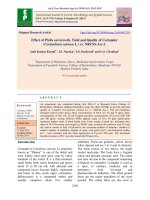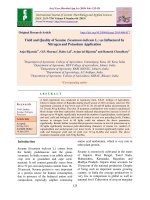Yield, per day productivity and quality of banana (Musa Paradisica L.) influenced by different varieties and planting materials under middle gujarat climatic condition
Bạn đang xem bản rút gọn của tài liệu. Xem và tải ngay bản đầy đủ của tài liệu tại đây (126.06 KB, 5 trang )
Int.J.Curr.Microbiol.App.Sci (2019) 8(1): 213-217
International Journal of Current Microbiology and Applied Sciences
ISSN: 2319-7706 Volume 8 Number 01 (2019)
Journal homepage:
Original Research Article
/>
Yield, Per Day Productivity and Quality of Banana (Musa paradisica L.)
Influenced by Different Varieties and Planting Materials
under Middle Gujarat Climatic Condition
H.C. Parmar*, Vinod B. Mor and Sunil R. Patel
Agriculture Research Station, College of Agriculture, Anand Agricultural University,
Jabugam-391 155, India
*Corresponding author
ABSTRACT
Keywords
Banana, Varieties,
Planting materials,
Yield, Quality, Per
Day Productivity
Article Info
Accepted:
04 December 2018
Available Online:
10 January 2019
An experiment entitled was conducted at the Agricultural Research Station, AAU,
Jabugam which comes under Middle Gujarat Agro-Climate Zone-III during seasons of the
year 2013-14 and 2014-15 on “Evaluation of different varieties of banana in tribal area of
Chhotaudepur Region of Middle Gujarat”. The experiment consisted of eight treatment
combinations comprised of four varieties (viz. V1.Grand Naine, V2.Robusta, V3.Mahalaxmi
and V4.William) and two planting materials (viz. P1. Tissue culture plants and P2. Suckers),
and conducted in RBD with factorial concept with four replications. The soil of the
experimental field was sandy loam in texture. All the plants were planted at 1.80 m
spacing with one plant per hole. Willium registered the highest yield among all in pooled
analysis and it was at par with Grand naine during 2014. On pooled basis, willium variety
also showed better pulp: peel ratio, where with regard to the PLW ratio, Mahalaxmi and
Willium were at par and recorded higher PLW ratio. Variety Grand Naine produced
significantly higher production per day (206 kg/ha) in pooled analysis, which was at par
with variety Willium (203 kg/ha). Banana raised through tissue also produced higher yield,
PLW ratio and per day productivity (211.2 kg/ha) than suckers.
Introduction
Banana is the largest produced and maximum
consumed amongst the fruits cultivated in
India. It is known as the „common man‟s
fruit‟. It is highly nutritive and very delicious.
Banana is known as apple of paradise. In
India, banana is fourth important food crops in
terms of gross value and is exceeded only by
paddy, wheat and milk products. Globally
banana production was 145 million tonnes
during 2012-13. India is the largest banana
consumer and producing country in the world
followed by Brazil, contributing about 20 per
cent of the total world production
(www.worldlistmania.com). Among the fruits,
banana holds first position in production and
productivity in India. It ranks second in area
after mango. In India, annual production of
banana is 26.51 million tonnes from an area of
7.76 lakh hectare with the productivity of
34.16 ton/ha spread all over the country (Dept.
213
Int.J.Curr.Microbiol.App.Sci (2019) 8(1): 213-217
of Agri. & cooperation, 2013). Banana covers
12.50 per cent of the total area under fruits,
contributing nearly one third of total fruit
production in the country. In India, Tamil
Nadu,
Karnataka,
Andhra
Pradesh,
Maharashtra, and Gujarat are the leading
banana producing states. The highest
productivity is 66.0 tones/ha in Madhya
Pradesh followed by Gujarat 64.09 t/ha in the
year 2012-13. Area and Production of banana
in Gujarat state were 67.02 thousand ha and
4.3 million metric tonnes, respectively (Dept.
of Agri. & cooperation, 2015). In Gujarat,
Bharuch district had maximum area (15420
ha) and production (1.08 million metric tonne)
followed by Anand and Vadodara district
(Directorate of economics and statistics, Govt.
of Gujarat, Gandhinagar, 2015).
an imported variety from Israel is gaining
popularity and may soon become the most
preferred variety due to its tolerance to abiotic
stresses and good quality bunches. Fruit
develops attractive uniform yellow colour
with better shelf life & quality than other
cultivars.
Banana is perennial which produce succeeding
generations of crop. The first cycle after
planting is called the plant crop or mother
crop. The ratoon or a lam is the sucker (also
called the follower) succeeding the harvested
plant.
Materials and Methods
During the past two decades the large-scale
cultivation of this fruit crop has undergone
considerable changes. Banana is perhaps one
of the major crops, which has accepted tissue
culture as a mode of propagation especially in
India. Shorter harvest times and enhanced
yields have popularized the cultivation of this
fruit crop with respect to the area of
cultivation and production by tissue culture
methods.
Commercially, bananas are classified as
dessert types and culinary types. The culinary
types have starchy fruits and are used in the
mature unripe form as vegetables. Important
cultivars include Dwarf Cavendish, Robusta,
Maha laxmi, William, Monthan, Poovan,
Nendran, Red banana, Nyali, Safed Velchi,
Basrai, Ardhapuri, Rasthali, Karpurvalli,
Karthali and Grand Naine etc. Grand Naine,
Fruits and vegetables are an important
component of a healthy diet. Some fruits like
bananas offer great medical benefits. This is
partly because bananas aid in the body's
retention of calcium, nitrogen, and
phosphorus, all of which work to build healthy
and regenerated tissues. Main objective of this
study was standardization of the yield
potential with quality under different varieties
with different planting materials.
An experiment entitled “Evaluation of
different varieties of banana in tribal area of
Chhotaudepur Region of Middle Gujarat” was
conducted at the Agricultural Research
Station, Anand Agricultural University,
Jabugam which comes under Middle Gujarat
Agro-Climate Zone-III during seasons of the
year 2013-14 and 2014-15. The experiment
consisted of eight treatment combinations
comprised of four varieties (viz. V1.Grand
Naine, V2.Robusta, V3.Mahalaxmi and
V4.William) and two planting materials (viz.
P1.Tissue culture plants and P2. Suckers), and
conducted in RBD with factorial concept with
four replications. The soil of the experimental
field was sandy loam in texture, low in OC%
and available N, medium in available P2O5
and K2O. All the plants were planted at 1.80 m
spacing with one plant per hole. Sowing date
of banana in 2013-14 and 2014-15 was 01-082014 and 07-08-2015, respectively. Each plant
of banana was fed with 10 kg FYM; 200g N;
100g P2O5; 200g K2O (Recommended dose of
NPK g/plant). Complete dose of phosphorus,
potassium and 20 per cent nitrogen were
214
Int.J.Curr.Microbiol.App.Sci (2019) 8(1): 213-217
applied as basal while remaining dose of
nitrogen applied as four equal split of 20% at
30, 60, 90 and 120 days after monsoon. Yield
(t/ha) was recorded at the time of bunch
harvesting, while Pulp: peel ratio and PLW
(physiological loss weight in g) ratio were also
had been taken after harvesting of banana. Per
day Productivity of banana calculated by
below formula.
individual years and in pooled analysis. It was
however at par with Grand naine during 2014.
On pooled basis, this variety also showed
better pulp: peel ratio as compared to other
varieties. With regard to the PLW ratio,
Mahalaxmi and Willium were at par and
recorded higher PLW ratio as compared to rest
of the varieties in pooled analysis. In case of
per day productivity of banana, Variety Grand
naine produced significantly higher production
per day (206 kg/ha) in pooled analysis, which
was at par with variety Willium (203 kg/ha).
Results and Discussion
Effect of planting materials
Effect of varieties
Plant height, plant girth, leaves per plant and
finger length were significantly influenced by
planting materials during both the years and in
pooled analysis. Whereas, number of hand per
bunch and finger girth were influenced due to
planting materials during one out of two years
and pooled analysis (Table 1 and 2).
Data presented in table indicates that different
varieties also differed significantly among
themselves in respect of yield and quality
parameters like pulp: peel and PLW ratio.
Among different varieties tested Willium
registered the highest yield among all during
Table.1 Yield and per day productivity of banana varieties as influenced by different planting
materials
Varieties
V1 : Grand naine
V2 : Robusta
V3 : Mahalaxmi
V4 : William
S.Em.+
C.D.0.05
Planting materials
P1: Tissue
P2: Suckers
S.Em.+
C.D.0.05
Sig. Interaction
C.V.%
2014
76.70
68.51
66.92
79.62
1.32
3.87
78.90
66.97
0.93
2.74
5.11
Yield, t/ha
2015
Pooled
77.35
77.03
72.24
70.37
75.62
71.27
84.20
81.91
2.32
1.33
6.81
3.80
81.60
73.11
1.64
4.81
8.46
80.25
70.04
0.94
2.69
7.09
215
Per day productivity, kg/ha
2014
2015
Pooled
205.4
206.6
206.0
181.6
191.9
186.7
173.1
193.6
183.4
196.4
209.5
203.0
3.55
6.11
3.53
10.43
17.96
10.08
206.8
171.4
2.51
7.38
5.31
215.5
185.3
4.32
12.70
8.62
211.2
178.3
2.50
7.13
7.25
Int.J.Curr.Microbiol.App.Sci (2019) 8(1): 213-217
Table.2 Quality parameters of banana varieties as influenced by different planting materials
Varieties
V1 : Grand naine
V2 : Robusta
V3 : Mahalaxmi
V4 : William
S.Em.+
C.D.0.05
Planting materials
P1: Tissue
P2: Suckers
S.Em.+
C.D.0.05
Sig. Interaction
C.V.%
2014
3.06
2.94
3.05
3.27
0.08
0.22
3.10
3.05
0.05
NS
7.00
Pulp : Peel Ratio
2015
Pooled
3.21
3.14
2.99
2.96
3.20
3.12
3.42
3.34
0.09
0.06
0.26
0.17
3.23
3.18
0.06
NS
3.17
3.11
0.04
NS
YP
7.38
7.69
Banana raised through tissue recorded higher
values of all these traits as compared to that
raised through suckers. Banana raised through
tissue required less number of days to attained
flowering and maturity as compared to that
raised through suckers during both the years
and in pooled analysis. Banana raised through
tissue also produced higher yield as compared
to that raised through suckers during both the
years and in pooled analysis. Plant materials
did not show any significant effects pulp: peel
ratio but it had significant on PLW ratio in
one out of two years and in pooled analysis.
In general, banana raised through tissue
recorded lesser PLW ratio as compared to
banana raised by suckers. Banana raised
through tissue culture plant, which found
significantly the highest per day productivity
(211.2 kg/ha) than suckers.
2014
10.94
11.43
12.96
12.99
0.38
1.11
PLW Ratio
2015
10.83
11.32
13.35
12.88
0.47
1.39
Pooled
10.88
11.37
13.16
12.94
0.30
0.86
11.61
12.55
0.27
0.79
8.87
11.62
12.60
0.33
NS
11.04
11.62
12.56
0.21
0.61
10.01
found significant in case of days to flowering
and maturity. Interactions YV and YP were
also found significant with respect to days to
flowering and maturity.
In conclusion, for getting higher yield with
per day productivity of banana, variety Grand
Naine planting through tissue culture plant.
References
/>/market.htm
Islam, M. S. 1998. Storage life and quality of
banana as affected by packaging and
coating materials. M.S. thesis, Institute
of Postgraduate Studies in Agriculture,
Salna, Gazipur, Bangladesh.
Natesh B.B., Aravindakshan M. and
Valsalakumari P.K. (1993). Effect of
split application of fertilizers in banana
Musa ABB „Nendran‟. South Indian
Hort. 41: 67-73.
Nascimento, W.M.O. et al., Selection of
progenies of yellow passion fruit
(Passiflora edulis f. flavicarpa) to fruit
Interaction effects
Interaction YP and YVP were found
significant in case of number of leaves per
plant in pooled analysis. Where, interaction
between variety and planting material was
216
Int.J.Curr.Microbiol.App.Sci (2019) 8(1): 213-217
quality. Brazilian Journal of Tropical
Fruits, 25:186-188, 2003.
Patil K B and Rawale K P (2009) Pre and post
harvest management of banana for
domestic and export market, in the
Proceedings of Second National
Conference on Production of Healthy
Planting Material in Banana, held
during October 3 - 6, 2009 at Jalgaon
MS.
Post harvest profile of banana: 2015,
Department of Agriculture and Cooperation, Ministry of Agriculture,
Govt. of India, pp 4-12 (2015).
Rangana, S. (1979). Manual of analysis of
fruit and vegetable products. Tata
McGraw Hill Publishing Company
Limited, NEW DELHI, INDIA.
Singh, H. P., Uma, S., Selvarajan, R. and
Karihaloo,
J.
L
(2011).
Micropropagation for production of
quality banana planting material in
Asia-pacific. Asia-Pacific Consortium
on
Agricultural
Biotechnology
(APCoAB), New Delhi, India. P. 3.
Venkata Subbaiah, K., Jagadeesh, S. L.,
Reddy, Sathyanarayana and Kanamadi,
V. C.. Effect of varieties and pretreatments on physico-chemical and
sensory quality of banana. Karnataka J.
Agric. Sci.,26 (1): (115-118) 2013.
How to cite this article:
Parmar, H.C., Vinod B. Mor and Sunil R. Patel. 2019. Yield, Per Day Productivity and Quality
of Banana (Musa paradisica L.) Influenced by Different Varieties and Planting Materials under
Middle Gujarat Climatic Condition. Int.J.Curr.Microbiol.App.Sci. 8(01): 213-217.
doi: />
217
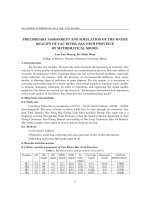
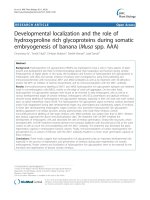



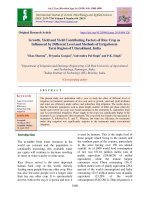
![Effect of fertility levels and stress mitigating chemicals on nutrient uptake, yield and quality of mungbean [Vigna radiata (L.) Wilczek] under loamy sand soil of Rajasthan](https://media.store123doc.com/images/document/2020_01/09/medium_ftp1578562755.jpg)
![Growth and yield of Ashwagandha [Withania somnifera (L.)] as influenced by different intercropping system in Kymore plateau of Madhya Pradesh](https://media.store123doc.com/images/document/2020_01/09/medium_vsb1578562778.jpg)
